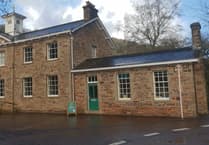TWO local communities could be among the first to test new powers aimed at protecting village amenities by preventing local shops and pubs from being turned into housing.
Residents in Monksilver and Shurton will be given first refusal if their local pubs, the Notley Arms and the Shurton Inn, are put up for sale.
Both pubs are currently closed and villagers are eager to ensure the public houses are not lost as community facilities.
Now, under the Localism Act 2011, neither pub can be sold on the open market unless the community has been given the chance to buy it first or the business is sold as a going concern.
On Wednesday, members of West Somerset Council's cabinet agreed to list the two pubs as community assets as defined by the Localism Act.
Councillors were told the owners of both premises had been informed and had the right to appeal against the decision.
The council's planning committee chairman Cllr Tony Knight said: "I have sat through so many meetings listening to people fighting to keep a community asset from development so I am very much in favour of this, particularly the Shurton Inn.
"That could so easily be the hub of the community again and I feel very sorry for what has happened there."
The Shurton Inn has been closed since 2010 and the owners subsequently lost an appeal against the council's refusal to grant planning permission to convert it into a private home and four ancillary letting rooms.
The owners claimed the business was unviable but residents blamed any downturn on management problems.
At the Notley Arms, the business underwent a major refurbishment but closed it doors less than 12 months later in September this year.
Councillors were told the bids for the two local pubs had come from Stogursey Parish Council in the case of the Shurton Inn and from both Monksilver Parish Council and a separate community group in the case of the Notley Arms.
The Shurton application said the inn had acted as a community hub for at least 150 years: "It is the only meeting place in the Shurton area for social interaction, news exchange and informal congregation and meeting.
"The inn has been the main means of maintaining social cohesion locally and its loss would have a highly detrimental effect on the community and its social and mental wellbeing.
"The recent closure of the pub has led to a dramatic collapse in the social structure within the area and has disrupted social activity considerably."
Monksilver Parish Council said the Notley Arms was a much-loved inn and had been a very successful business.
"The community is desperate to have the pub trading again but its future is threatened by the stated wish of the owner to sell it as a residential property," the council said.
Members of the Monksilver Action Group said the pub was a local landmark and a great rural meeting place.
Under the Act, any parish council or community group with more than 21 members can nominate land or buildings as "assets of community value".
Community assets can include pubs, village halls, shops and recreation grounds but cannot include properties deemed to be "wholly residential".
If a building or land is accepted by the local authority as a community asset, nothing happens until the owners decide to sell.
Unless an exemption applies, such as the land or building being sold as a going concern, the owner must give the nominators first refusal to buy.
The parish council or group then has six weeks to decide whether to submit a bid to try and buy the asset for the community.
If no bid is made, the owner is free to sell on the open market.
However, if a bid is received, a six month moratorium is put on the sale to give the community group or parish council time to try and raise the necessary funds to purchase the asset.
After the six months has lapsed and if no offer to buy has been made, the owner is then able to market the asset on the open market - but only for a limited time of 12 months.
If no buyer is found within that time, the whole process begins again.
Cabinet members were told the owners of both premises had the right to appeal against the listing of the pubs as community assets through the authority's scrutiny committee.
If the owners and the council remained in disagreement, the owners could still appeal to an independent tribunal.
Councillors said the community asset process was part of a nationwide scheme and all local authorities had to draw up lists of community assets to satisfy the Localism Act 2011.
Equally, all authorities were liable to pay compensation to owners of land or buildings deemed to be community assets if they could prove they had suffered a financial loss as a result of the process.
The council would only be liable up to a maximum of £20,000 a year, with any additional claims being funded by the Government.
* In addition to the community asset process, the Localism Act 2011 also includes provision for "community right to challenge", which gives a range of organisations and groups the opportunity to ask to run a service that is either run by or on behalf of a local authority.




Comments
This article has no comments yet. Be the first to leave a comment.